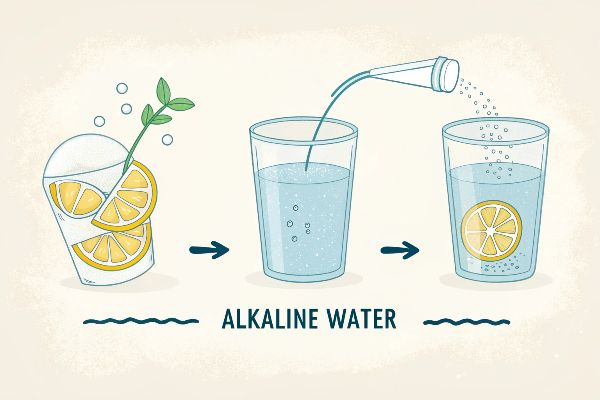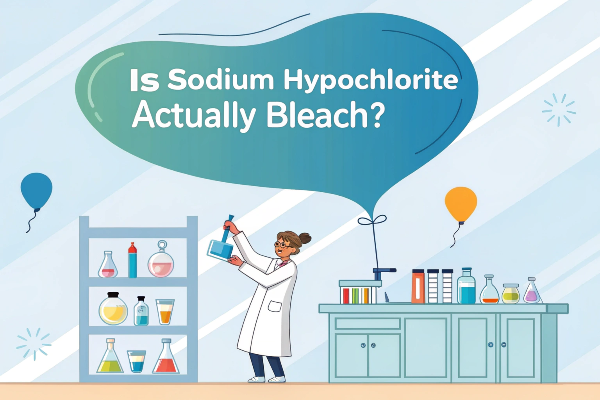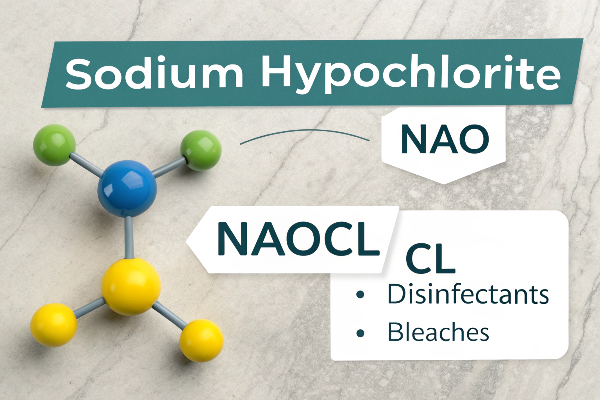Struggling with complex or pricey alkaline water options? It’s frustrating! Good news: you can easily make natural, low-cost alkaline water right in your kitchen, and I’ll show you how.
You can make alkaline water by adding simple ingredients like baking soda or lemon juice to regular water. Using a water ionizer machine or special alkaline water filters are other common methods available.
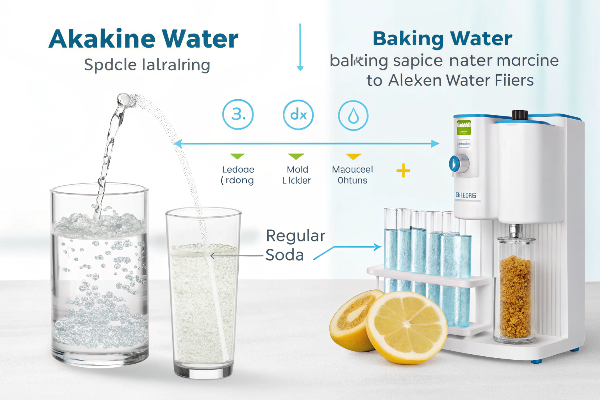
So, those are the basic ways. But you probably want to know the details, especially how to do it safely and effectively at home without spending a fortune. Let’s dive into the specifics and explore the popular methods people are talking about.
How do you make alkaline water at home?
Thinking about making alkaline water at home? Maybe you’re concerned about safety or the high cost of specialized machines you see online. Luckily, simple, reliable, and very affordable DIY methods are easily available.
The easiest ways I’ve found to make alkaline water at home involve adding a small pinch of baking soda1 or a squeeze of fresh lemon juice to your water. You can easily check the pH using test strips.

Making alkaline water at home doesn’t have to be complicated or break the bank. Many people, myself included, started exploring this out of curiosity or a desire for potential health benefits without investing heavily upfront. There are a few popular routes you can take, each with its pros and cons.
The Baking Soda Method
This is probably the simplest way.
- How: Just add a tiny amount of baking soda (sodium bicarbonate) – about 1/8th teaspoon to a large glass (8 ounces) of water – and stir until it dissolves.
- Pros: It’s incredibly cheap, readily available, and definitely increases the water’s pH quickly.
- Cons: The taste isn’t great for everyone. More importantly, baking soda is high in sodium. If you’re watching your sodium intake due to high blood pressure or other health reasons, this method isn’t ideal for regular use. I tried it for a while but found I needed to be careful about the amount.
- Tools: Just baking soda, water, and maybe pH test strips2 if you want to verify.
The Lemon Juice Method
This one sounds counterintuitive, right? Lemon juice is acidic!
- How: Squeeze about 1/8th to 1/4th of a lemon into a glass of water.
- The Twist: While acidic initially, proponents believe that after your body metabolizes the lemon juice, it has an alkalizing effect on your system. The water itself doesn’t become highly alkaline immediately.
- Pros: It’s natural, adds a fresh taste, and provides Vitamin C3.
- Cons: It doesn’t significantly raise the water’s pH in the glass. The alkalizing effect4 is metabolic and debated in scientific circles.
- Tools: Lemons, water.
Comparing Home Methods vs. Machines
| Feature | Baking Soda Method5 | Lemon Juice Method | Water Ionizer Machine | Alkaline Filter Pitcher |
|---|---|---|---|---|
| Cost | Very Low | Low | High | Moderate |
| Ease of Use | Very Easy | Very Easy | Easy (once set up) | Easy |
| pH Change | High (immediate) | Minimal (in glass) | High (adjustable) | Moderate |
| Added Benefit | None (adds sodium) | Vitamin C3 | Often adds minerals | Often adds minerals |
| Potential Issue | High Sodium | Metabolic effect debated | Cost, Maintenance | Filter replacement cost |
Ultimately, starting with baking soda (sparingly) or lemon water are easy entry points. If you decide you want consistently higher pH water, then looking into filters or machines might be the next step, but try the simple ways first.
Does lemon water make water alkaline?
Does adding acidic lemon juice somehow make your water alkaline? It sounds confusing, almost contradictory, doesn’t it? But the surprising answer lies not in the glass, but in how your body actually processes the lemon.
Lemon juice itself is acidic (low pH). However, once your body metabolizes it, proponents claim it produces alkaline byproducts6, potentially helping to balance your body’s overall pH. It doesn’t make the water highly alkaline.
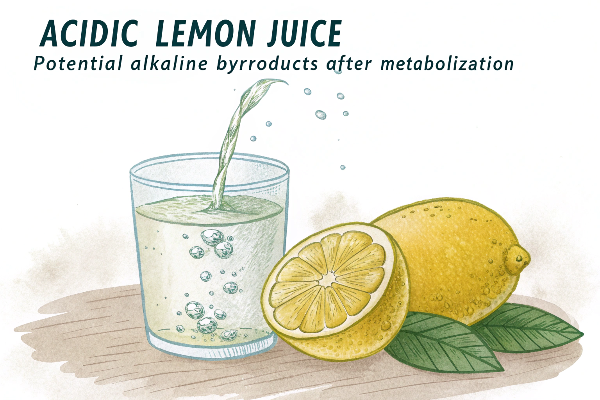
This is one of the most common questions I hear, and it took me a while to wrap my head around it too. The key is understanding the difference between the food’s pH before you consume it and its effect after digestion and metabolism.
The Science Bit: Metabolism Matters
Foods are often categorized as acid-forming or alkaline-forming7 based on the residue they leave behind after your body breaks them down.
- Acidic taste ≠ Acid-forming: Lemons and other citrus fruits taste acidic due to citric acid. However, during metabolism, citric acid is used up in the Krebs cycle (our body’s energy production process).
- Alkaline Minerals: Lemons also contain minerals like potassium and magnesium. When the citric acid is metabolized, these alkaline minerals8 are left, contributing to an overall alkaline load or alkaline ash. This is thought to help buffer acidity in the body, particularly showing up as increased urine pH. I remember reading a study suggesting citric acid consumption could lead to less acidic urine, which supports this idea.
Lemon Water pH: In the Glass vs. In the Body
So, when you add lemon juice to water:
- In the Glass: The pH of the water will drop slightly, becoming more acidic because you’ve added an acid. If you test it with pH strips9, it won’t show an alkaline reading.
- In the Body: After drinking it, your digestive system and metabolic processes take over. The citric acid10 is converted to energy, and the remaining minerals exert an alkaline effect11 within your system.
It’s crucial to understand this distinction. You aren’t drinking high-pH water when you drink lemon water. You’re consuming something that may help promote alkalinity internally through metabolic processes. It’s a more indirect effect compared to drinking water that is already alkaline (like from an ionizer or with baking soda). Think of it less as changing the water, and more as providing ingredients your body uses to maintain its balance.
Is alkaline water just water with baking soda?
Wondering if that expensive bottled alkaline water, or the water from fancy machines, is just tap water with a bit of baking soda mixed in? It feels like maybe companies are just hyping up something simple. Baking soda is one way, but it’s definitely not the whole story.
No, alkaline water12 isn’t just water with baking soda. While adding baking soda does raise water’s pH temporarily and cheaply, other methods like water ionizers13 use electrolysis to change water structure and add minerals, offering potentially different effects.
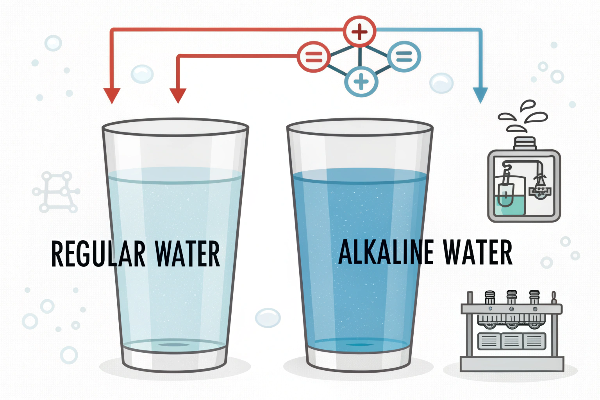
It’s easy to be skeptical, especially with all the marketing buzz around alkaline water. When I first looked into it, I had the same question. Let’s break down the differences because simply adding baking soda is quite distinct from other methods, particularly water ionization.
Baking Soda: The Quick pH Fix
Adding sodium bicarbonate14 (baking soda) is a chemical method.
- Mechanism: It directly dissolves in water, releasing bicarbonate ions which are alkaline and raise the water’s pH.
- Effect: It’s a temporary boost. The underlying water structure isn’t fundamentally changed beyond the addition of sodium and bicarbonate.
- Key Concern: As mentioned before, the big drawback is the added sodium. Regular consumption can significantly increase your daily sodium intake, which is a health concern for many, especially those managing blood pressure. I personally avoid relying on this method for that reason.
Water Ionizers: Electrolysis in Action
These machines work differently.
- Mechanism: They use electrolysis. Water passes over charged plates (electrodes). This process splits water molecules (H2O) into acidic ions (H+) and alkaline ions (OH-). It also concentrates alkaline minerals15 already present in the tap water (like calcium, magnesium) into the alkaline stream.
- Effect: This produces water with a higher pH and potentially a negative Oxidation-Reduction Potential (ORP)16, which proponents claim has antioxidant effects. The change is more structural, not just additive.
- Key Concern: The main barrier here is cost. Ionizers can be expensive, ranging from hundreds to thousands of dollars. They also require proper maintenance.
Other Methods Matter Too
Beyond these two, you also have alkaline water filters (pitchers or under-sink systems) that typically use mineral cartridges to add alkaline minerals15 (like calcium, magnesium, potassium) and raise pH, often while filtering contaminants.
Here’s a quick comparison:
| Method | Primary Mechanism | Key Added Substance | Main Pro | Main Con |
|---|---|---|---|---|
| Baking Soda | Chemical Addition | Sodium Bicarbonate | Cheap, Fast | High Sodium, Taste |
| Water Ionizer | Electrolysis17 | Concentrated Minerals | High pH, Neg ORP | Very Expensive |
| Alkaline Filter | Mineral Addition | Alkaline Minerals | Filters + Alkalizes | Filter Cost, Variable pH |
So, while baking soda can make water alkaline, it’s a specific method with significant drawbacks (sodium). True ionized alkaline water or filtered alkaline water are produced differently and don’t rely on adding baking soda.
Does adding Himalayan salt to water make it alkaline?
You’ve probably seen the wellness trend: adding a pinch of pink Himalayan salt18 to your morning water. It looks pretty, and people claim various benefits. But does this trendy mix actually make your water significantly alkaline? The answer is a bit more nuanced.
Adding Himalayan salt to water generally has a minimal effect on its pH, meaning it doesn’t make it significantly alkaline. Its main contribution is adding trace minerals19 and electrolytes, not drastically changing the water’s alkalinity.
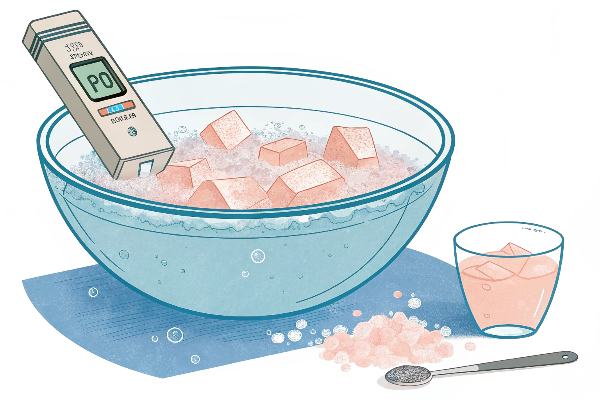
I remember trying the Himalayan salt trend myself, curious about the hype. While it adds a slightly different taste and the idea of extra minerals is appealing, I didn’t notice a significant alkaline shift when I tested the pH. Here’s a deeper look.
Salt and pH: A Tiny Bump, If Any
- Neutral Salt: Pure sodium chloride (table salt) is a neutral salt. Dissolving it in pure water doesn’t really change the pH.
- Himalayan Salt Minerals: Himalayan salt isn’t pure sodium chloride; it contains dozens of trace minerals. Some of these minerals might have a very slight alkalizing effect depending on their form and the starting water’s chemistry, but it’s generally considered negligible compared to methods like adding baking soda or using an ionizer. The amount of salt you’d need to add to make a meaningful pH difference would likely make the water unpalatable and excessively high in sodium.
The Real Benefit: Minerals and Electrolytes
The more recognized benefit of adding Himalayan salt (or other mineral-rich salts like Celtic sea salt) to water is hydration support through electrolytes.
- Electrolytes: Salt provides sodium and chloride, key electrolytes. The trace minerals in Himalayan salt (like potassium, magnesium, calcium, though in small amounts) also contribute.
- Hydration: Electrolytes help your body regulate fluid balance and nerve function. Adding a small pinch of salt to water can sometimes help with hydration, especially after sweating heavily or if you’re drinking highly purified water (like reverse osmosis) that lacks minerals.
- Taste: Some people simply prefer the taste.
Combining for Effect?
If you enjoy the mineral aspect but still want a more noticeable alkaline boost, you could combine a pinch of Himalayan salt with other methods. For instance:
- Add salt and a squeeze of lemon (for the metabolic alkaline effect + minerals).
- Use filtered alkaline water and add a pinch of salt for extra electrolytes.
I’ve sometimes added a tiny pinch to my lemon water in the morning.
So, while Himalayan salt water is popular for its potential mineral and electrolyte benefits, don’t rely on it as your primary method for making water alkaline. Its effect on pH is minimal at best. Think of it more as a mineral supplement for your water.
Who should not drink alkaline water?
Is alkaline water good for absolutely everyone? You might be wondering if there are any potential downsides or if certain people should perhaps avoid it. For most healthy individuals, it’s generally considered safe, but there are specific groups who should be cautious or steer clear.
People with kidney problems20, those with low stomach acid21 (hypochlorhydria), or individuals taking certain medications that are affected by stomach pH should avoid alkaline water or consult their doctor before drinking it regularly.

Safety should always come first when trying something new related to health. While proponents highlight benefits, it’s crucial to consider potential contraindications. Based on medical advice and research I’ve encountered, here are the main groups who need to be careful:
Kidney Concerns
- Why: Your kidneys play a vital role in regulating your body’s pH balance and managing minerals. If you have chronic kidney disease or impaired kidney function, your kidneys might struggle to process the excess minerals or handle the pH load from consistently drinking highly alkaline water.
- Recommendation: Definitely talk to your doctor or nephrologist before considering alkaline water if you have any kidney issues.
Stomach Acid Issues
- Why: Your stomach relies on a highly acidic environment (low pH) to properly digest food (especially proteins) and kill ingested bacteria or pathogens. Regularly drinking highly alkaline water, especially around mealtimes, could potentially neutralize stomach acid.
- Conditions: People with conditions causing low stomach acid (hypochlorhydria or achlorhydria) should be particularly cautious. Temporarily neutralizing stomach acid might worsen digestion and nutrient absorption. I personally try to avoid drinking it right before or during meals for this reason.
- Recommendation: If you have digestive issues or known low stomach acid, consult your doctor.
Medication Interactions
- Why: The absorption of certain medications depends on the acidic environment of the stomach. Altering stomach pH with alkaline water could potentially interfere with how these drugs are absorbed and how effective they are.
- Recommendation: If you are taking any prescription medications, especially those for stomach conditions or drugs known to have pH-dependent absorption22, discuss alkaline water use with your doctor or pharmacist.
General Precautions
Even for healthy individuals, moderation is key.
- pH Level: Drinking water with an extremely high pH (e.g., above 10) isn’t generally recommended. Most commercially available alkaline waters are in the 8-9.5 pH range.
- Listen to Your Body: Pay attention to how you feel. If you experience any digestive upset or other unusual symptoms after starting alkaline water, stop drinking it and consult a healthcare professional.
The bottom line is: alkaline water isn’t a magic bullet, and it’s not suitable for everyone. When in doubt, especially if you have pre-existing health conditions, always prioritize professional medical advice.
Conclusion
Making alkaline water at home is definitely possible using simple methods like baking soda or lemon, but it’s important to understand the differences, potential drawbacks like sodium, and who should avoid it.
-
Understanding how baking soda influences pH levels can enhance your DIY alkaline water-making process. ↩
-
Finding the best pH test strips ensures accurate measurement of your alkaline water, making your DIY efforts more effective. ↩
-
Vitamin C is essential for health. Discover its benefits and how it supports your immune system by exploring this informative link. ↩ ↩
-
Understanding the alkalizing effect of lemon juice can help you make informed health choices. Explore this resource for deeper insights. ↩
-
Learn how the Baking Soda Method can effectively alkalize water and its potential health benefits by checking out this resource. ↩
-
Understanding alkaline byproducts can clarify how lemon juice affects body pH, enhancing your health knowledge. ↩
-
Exploring this classification helps you make informed dietary choices for better health and balance. ↩
-
Discovering the benefits of alkaline minerals can enhance your understanding of nutrition and its impact on health. ↩
-
Understanding pH strips can enhance your knowledge of acidity and alkalinity, crucial for interpreting lemon water’s effects. ↩
-
Exploring citric acid’s benefits can provide insights into how lemon water affects your body and metabolism. ↩
-
Learning about the alkaline effect can help you understand how lemon water contributes to your body’s pH balance. ↩
-
Discover the potential health benefits of alkaline water and why it might be worth considering in your diet. ↩
-
Explore the benefits of water ionizers to understand how they differ from simple baking soda methods for creating alkaline water. ↩
-
Learn how sodium bicarbonate alters water pH and its implications for health and hydration. ↩
-
Learning about alkaline minerals can enhance your knowledge of their role in health and water quality. ↩ ↩
-
Exploring ORP can reveal its importance in health and water quality, especially in ionized water. ↩
-
Understanding electrolysis is key to grasping how water ionizers work and their benefits. ↩
-
Explore the health benefits of Himalayan salt, including its trace minerals and potential effects on wellness. ↩
-
Discover the importance of trace minerals in our diet and their various health benefits. ↩
-
This link will offer insights into how kidney health impacts the safety of drinking alkaline water, crucial for those with kidney issues. ↩
-
Understanding the relationship between low stomach acid and alkaline water can help you assess its safety for your health needs. ↩
-
Learn how pH levels can impact medication absorption, ensuring you take your medications effectively. ↩



